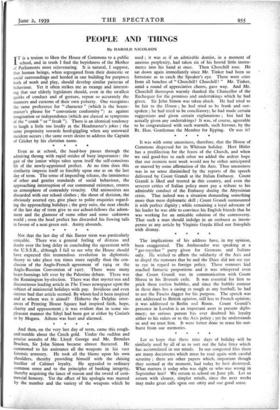Not that the last day of this Easter term was
particularly amicable. There was a general feeling of distress and doubt over the long delay in concluding the agreement with the U.S.S.R., although I fail to see why the House should have expected this tremendous revolution in diplomatic theory to take place ten times more rapidly than the con- clusion of the Anglo-French agreement of 5904 or the Anglo-Russian Convention of 5907. There were many heart-burnings left over by the Palestine debate. There was the Kennington by-election. There was that mystef ous and discourteous leading article in The Times newspaper upon the subject of ministerial holidays with pay. Invidious and even sinister had that article seemed. By whom had it been inspired and at whom was it aimed? Hitherto the Delphic utter- ances of Printing House Square had inspired faith, hope, charity and appeasement ; it was evident that in some un- pleasant manner the Sibyl had been got at either by Corinth or by Megara. Athens was hurt and alarmed.










































 Previous page
Previous page